Related Research Articles

The Peloponnese, Peloponnesia, or Peloponnesus is a peninsula and geographic region in southern Greece. It is connected to the central part of the country by the Isthmus of Corinth land bridge which separates the Gulf of Corinth from the Saronic Gulf. During the late Middle Ages and the Ottoman era, the peninsula was known as the Morea, a name still in colloquial use in its demotic form.

Macedonians are a nation and a South Slavic ethnic group native to the region of Macedonia in Southeast Europe. They speak Macedonian, a South Slavic language. About two-thirds of all ethnic Macedonians live in North Macedonia and there are also communities in a number of other countries.

The Orlov revolt was a Greek uprising in the Peloponnese and later also in Crete that broke out in February 1770, following the arrival of Russian Admiral Alexey Orlov, commander of the Imperial Russian Navy during the Russo-Turkish War (1768–1774), at the Mani Peninsula. The revolt, a major precursor to the Greek War of Independence, was part of Catherine the Great's so-called "Greek Plan" and was eventually suppressed by the Ottomans.
The following is a timeline of major events from the 5th to 15th centuries, loosely corresponding to the Old World Middle Ages, intermediate between Late Antiquity and the early modern period.
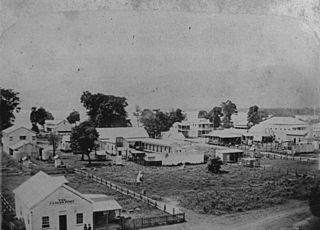
The Cairns Post is a major News Corporation newspaper in Far North Queensland, Australia, that exclusively serves the Cairns area. It has daily coverage on local, state, national and world news, plus a wide range of sections and liftouts covering health, beauty, cars and lifestyle. The Cairns Post is published every weekday and a weekend edition which is called The Weekend Post which is published on Saturdays.
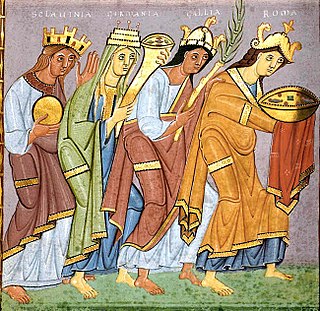
The Sclaveni or Sklabenoi were early Slavic tribes that raided, invaded and settled the Balkans in the Early Middle Ages and eventually became known as the ethnogenesis of the South Slavs. They were mentioned by early Byzantine chroniclers as barbarians having appeared at the Byzantine borders along with the Antes, another Slavic group. The Sclaveni were differentiated from the Antes and Wends ; however, they were described as kin. Eventually, most South Slavic tribes accepted Byzantine suzerainty, and came under Byzantine cultural influence. The term was widely used as general catch-all term until the emergence of separate tribal names by the 10th century.

William Heinemann Ltd., with the imprint Heinemann, was a London publisher founded in 1890 by William Heinemann. Their first published book, 1890's The Bondman, was a huge success and launched the company. He was joined in 1893 by Sydney Pawling. Heinemann died in 1920 and Pawling sold the company to Doubleday, having worked with them in the past to publish their works in the United States. Pawling died in 1922 and new management took over. Doubleday sold his interest in 1933.
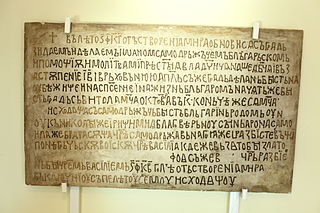
The komes ("count") Nicholas was a local ruler in Bulgaria, probably of Armenian origin, and progenitor of the Cometopuli dynasty.
Cuthbert Burby was a London bookseller and publisher of the Elizabethan and early Jacobean eras. He is known for publishing a series of significant volumes of English Renaissance drama, including works by William Shakespeare, Robert Greene, John Lyly, and Thomas Nashe.
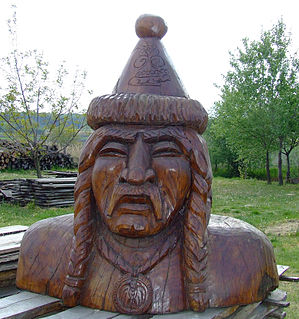
Csanád, also Chanadinus, or Cenad, was the first head (comes) of Csanád County in the Kingdom of Hungary in the first decades of the 11th century.
Florin Curta is a Romanian-born American archaeologist and historian who is a Professor of Medieval History and Archaeology at the University of Florida.
The Chronicle of Monemvasia, rarely known as the Chronicle of the Peloponnesos, is a medieval text of which four versions, all written in medieval Greek, are extant. The author of the account is currently unknown. The Chronicle, specifically the version from the Iberikon monastery, narrates the events that depict the Avaro-Slavic conquest and colonization of mainland Greece, covering a period from 587 to 805 AD. Despite its compelling narrative, the Chronicle is not an actual chronicle. The text represents a compilation of sources involving Avars and Slavs and focuses on the foundation of the metropolitan see of Patras. It is possible that the Chronicle was actually used in negotiations with the metropolitan of Corinth over the status of the metropolitan of Patras.
Boz was the king of the Antes, an early Slavic people that lived in parts of present-day Ukraine. His story is mentioned by Jordanes in the Getica (550–551); in the preceding years, the Ostrogoths under Ermanaric had conquered a large number of tribes in Central Europe, including the Antes. Some years after the Ostrogothic defeat by the invading Huns, a king named Vinitharius, Ermanaric's great-nephew, marched against the Antes of Boz and defeated them. Vinitharius condemned Boz, his sons, and seventy of his nobles, to crucifixion, in order to terrorize the Antes. These conflicts constitute the only pre-6th century contacts between Germanics and Slavs documented in written sources.
Nicholas Doumanis is an historian of Europe and the Mediterranean world. Born in Australia in 1964, he studied at the University of Sydney and the University of New South Wales, where he acquired his PhD. Nicholas is currently an Associate Professor of History at the University of New South Wales, and has lectured in European history at Macquarie University and the University of Newcastle. Nicholas is a recipient of the Stanley J. Seeger Fellowship at Princeton University. Doumanis was awarded the Fraenkel Prize (London) in Contemporary European History for Myth and Memory in the Mediterranean. He has since published: Italy, Inventing the Nation which was translated into Italian by Il Mulino press: Una Facia Una Razza, and more recently A History of Greece covering the span of paleolithic to contemporary Greece. His latest book is Before the Nation with Oxford University Press. Nicholas is currently editing The Oxford Handbook of Europe 1914-1945 and writing a history of the Eastern Mediterranean from the Bronze Age to the present for Wiley Blackwell in its History of the World series. Doumanis is the Founder and Director of the Greek-Australian Archive of NSW, Australia. Nicholas is also a member of the Australian Committee for the restitution of the Parthenon Marbles. Doumanis is also an Australian Research Council Fellow at the University of Sydney, and was the former Senior Editor of The Journal of Religious History. Academia.au
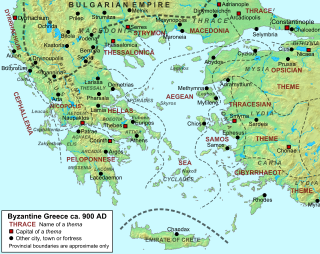
The Theme of the Peloponnese was a Byzantine military-civilian province encompassing the Peloponnese peninsula in southern Greece. It was established in c. 800, and its capital was Corinth.
The Belegezites were a South Slavic (Sklavenoi) tribe that lived in the area of Thessaly in the Early Middle Ages. They are one of the tribes listed in the Miracles of Saint Demetrius.
Theoktistos Bryennios was a Greek nobleman and a Byzantine general who quelled a Slavic rebellion in the Peloponnese in 842.
Thomas W. Gallant is a historian who specializes in modern Greek history and archaeology.
John Proteuon was the Byzantine governor (strategos) of the Theme of the Peloponnese in ca. 921/2.
The Japanese Group was an unofficial name for a political grouping in the Hellenic Parliament in 1906–08.
References
- ↑ "See publisher site".
- ↑ "See publisher site".
- ↑ "See publisher site".
- 1 2 3 "Edinburgh University Press Books". edinburghuniversitypress.com.
- ↑ "See Trove entry for Curta's editions".
- ↑ "See Trove entry for Greene's editions".
- ↑ "See Trove entry for Gallant's editions".
- ↑ "The Edinburgh History of the Greeks, 1909 to 2012: A Transnational History by Doumanis, Nicholas (9781474410847) | BrownsBfS". www.brownsbfs.co.uk.
- ↑ "See Google books".